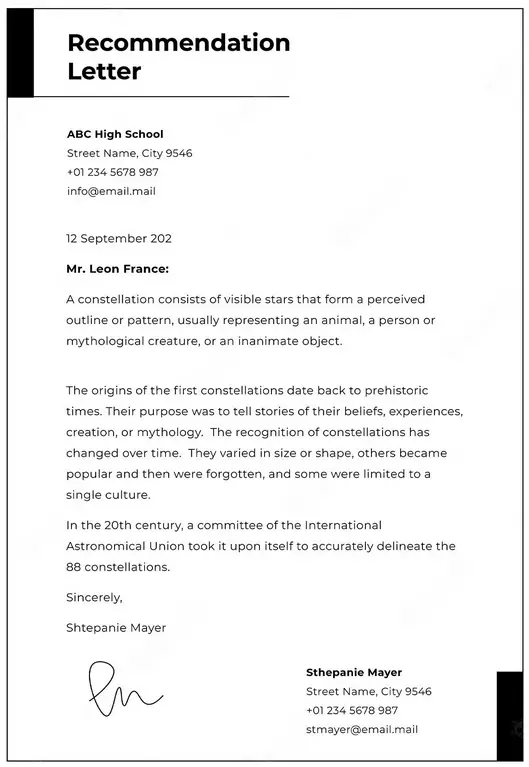So you’ve been asked to write a letter of recommendation for someone – relax, you’ve got this. Being asked to write a recommendation letter is actually flattering – the colleague or friend requesting the reference likely thinks highly of you and your accomplishments, else they would have asked someone else.
It can seem intimidating or feel like a chore, but remember that writing a letter of recommendation is a way to give back to others: it is a simple way to support a colleague’s professional development and career growth, or to help out friend looking to rent a new accommodation. It isn’t as difficult as you may think, but it’s hard to write an exceptional letter without an exceptional candidate.
 Help a colleague ascend the corporate hierarchy by writing them a letter of recommendation.
Help a colleague ascend the corporate hierarchy by writing them a letter of recommendation.
Types of letters of recommendation
Before you write one, it helps to be clear about what you’re writing.
Letters of recommendation are written documents that provide evidence of a person’s skills, abilities, and character. They are typically used (but not limited) to support applications for jobs, scholarships, or tenancy. Notice the similarities and differences in the list of letters below.
Depending on your position and relationship to the recipient, you might be asked to write any of the following types of letters of recommendation:
Academic letters of recommendation
- Typically written by a professor, teacher, or other academic advisor.
- Letters are used to support applications for college admissions, scholarships, and other educational opportunities.
- Academic letters of recommendation should focus on the applicant’s academic performance, intellectual abilities, and potential for success in their chosen field.
- The letter should also include any relevant personal qualities that make the applicant stand out from their peers.
- When writing an academic letter of recommendation it is important to provide specific examples and evidence to back up your claims about the applicant’s abilities and character.
Employment letters of recommendation
- Typically written by a former employer or supervisor.
- Personal business reference used to support applications for jobs and other professional opportunities.
- Employment letters of recommendation should focus on the applicant’s work experience, skills, and accomplishments.
- Include any relevant personal qualities that make the applicant stand out from their peers.
- When writing an employment letter of recommendation it is important to provide specific examples and evidence to back up your claims about the applicant’s abilities and character.
Character reference letters
- Typically written by family members, friends, or other people who know the applicant well.
- Used to support applications for jobs, scholarships, or other opportunities.
- Character reference letters should focus on the applicant’s personal qualities and character traits.
- Include any relevant experiences or anecdotes that demonstrate the applicant’s abilities and potential for success.
- When writing a character reference letter it is important to provide specific examples and evidence to back up your claims about the applicant’s character.
Professional letters of recommendation for a colleague
- Typically written by a colleague or former co-worker.
- Used to support applications for jobs and other professional opportunities.
- Focus on the applicant’s work experience, skills, accomplishments, and ability to work well with others.
- Include any relevant personal qualities that make the applicant stand out from their peers.
- When writing a professional letter of recommendation it is important to provide specific examples and evidence to back up your claims about the applicant’s abilities and character.
Home rental referrals and letters of reference
- Typically written by a landlord, tenant, or other person who knows the applicant well.
- Used to support applications for home rentals and other housing opportunities.
- Home rental referrals and letters of reference should focus on the applicant’s ability to pay rent on time, take care of the property, and be a responsible tenant.
- Include any relevant personal qualities that make the applicant stand out from their peers.
- When writing a home rental referral or letter of reference it is important to provide specific examples and evidence to back up your claims about the applicant’s character and abilities as a tenant.
The nitty gritty: How to write & format a recommendation letter
When writing a letter of recommendation, it is proper (and makes writing easier) to follow a specific format.
Formatting and sending your letter of recommendation depends on your relationship with the recipient. If you’re an old friend or former colleague, then e-mail is perfectly acceptable. If you don’t know the recipient, then it should be typed, printed, and formatted as any other professional letter.
Technically, the format follows that of a typical letter: Address, date, greeting, body of letter, ending, signature.
 The technical form of a recommendation letter.
The technical form of a recommendation letter.
Here are five tips to help you write an effective letter of recommendation for a colleague, but the format holds true for other types of reference letters, too:
- What is the purpose of the letter. What is the colleague being recommended for? They will need to provide this information to you before you begin writing. This will help you focus your letter and tailor it to the specific opportunity or position.
- Describe your relationship with the colleague. How long have you known them? In what capacity have you worked together? Provide some context so the reader has a sense of your relationship and the depth of your knowledge of the colleague.
- Describe the colleague’s relevant skills and experience. Focus on specific examples and accomplishments that demonstrate their suitability for the position or opportunity.
- Emphasize the colleague’s personal qualities and attributes. Many people are “conscientious” but how do they exhibit this trait exactly? And what sets them apart from other candidates? How do they interact with others, solve problems, or contribute to a team?
- Conclude by expressing your strong recommendation. Summarize the colleague’s strengths and qualifications, and explain why you believe they would be a valuable asset to the organization or opportunity they are pursuing.
Write in a professional tone, and avoid using overly casual language or slang words that could be misinterpreted by the reader. Ambiguity is not your friend when compiling a thoughtful recommendation. As always, proofread your letter for any spelling or grammar mistakes before sending it off.
Letter of recommendation examples
When writing a letter of recommendation, it can be helpful to look at examples to get an idea of what should be included.
Reminders:
- The introduction should include an overview of the applicant’s qualifications and why they are being recommended.
- The body should provide specific examples and evidence to back up your claims about the applicant’s abilities and character.
- The conclusion should summarize the key points of your letter and reiterate your recommendation for the applicant.
Here are some examples of letters of recommendation that you can use as a guide:
Example 1: Professional Reference
May 9, 2022
To Whom It May Concern:
I am pleased to recommend [colleague] for the position of [position]. I have worked with [colleague] for [this length of time] and have seen firsthand their dedication and commitment to their work. In this time, I have seen [colleague] develop strong skills in [name skill or field], which makes them an ideal candidate for the role.
Not only is [colleague] knowledgeable in their field, but they also bring a positive attitude and enthusiasm to every project. They are great at working collaboratively with others and have a knack for problem-solving. I am confident that they would be an asset to any team.
I highly recommend [colleague] for the position of [position] and believe they will be successful in this role.
Example 2: Professional Reference
November 2, 2022
To Whom It May Concern:
It is my pleasure to recommend [colleague] for the position of [position]. I have had the privilege of working with [colleague] for over [length of time] and can attest to their excellent work ethic and dedication to their craft. [colleague] has a wealth of knowledge in [field] and has consistently demonstrated their ability to take on challenging projects with enthusiasm and success.
In addition, [colleague] brings strong interpersonal skills to the table, making them an effective team player who is able to collaborate effectively with others. They are also highly organized, reliable, and possess excellent communication skills.
I wholeheartedly recommend [colleague] for the position of [position] and believe they will be a valuable asset to your organization.
Example 3: Character Reference
May 11, 2022
To Whom It May Concern:
I would like to recommend [person] without reservation for the position of [position]. I have known [person] for the past ten years, and she is an ambitious woman of the highest moral conviction and character.
I met [person] when she was the [past position]—I was instantly moved by her passion for volunteering and community. Subsequently, I was impressed by her leadership skills and effectiveness as a public speaker.
On a personal note, [person] has been a reliable friend as well as a visibly wonderful wife and mother. She has a sound Christian faith that inspires all of her decisions. [person] is sure to bring her spirited set of family values and commitment to any position that she holds. If you’d like to discuss
her attributes further, please don’t hesitate to contact me.
Cordially,
[me]
Example 4: How to write a recommendation letter for your children or relatives
July 20, 2023
Dear Ms. Drummond,
I am writing on behalf of my daughter, Lana Nigh, requesting that she be considered for acceptance to Maryland Academy.
Understandably it is difficult for a mother to be objective about her daughter, but I’ll do my best to paint an impartial picture.
Lana is an intellectually and athletically ambitious young woman. She has been on the honor roll consistently throughout grammar school. She enjoys being a member of the student government as well as singing in the choir. She is an avid soccer and basketball player and looks forward to participating in both on her high school teams.
On the flip side, Lana will put off schoolwork for the sake of a good book any day. It’s difficult for me to discourage her from reading so much, but her schoolwork must come first. She also doesn’t like to ask for help. She prefers to figure things out on her own, which hasn’t been a huge problem so far but I’m afraid it will be as her studies become increasingly difficult.
My husband and I look forward to being full participants throughout Kelley’s high school career. Whether this means helping with homework, attending every soccer and basketball game, or donating time and money to charity events we are happy and excited to oblige.
I believe an education founded on the principles of the Quaker order will benefit Lana immensely. She will leave Maryland Academy equipped with the tools and moral convictions she needs to excel in college as well as afterward. She would certainly be a lively and gifted addition next fall, and I hope you’ll consider admitting her. Thank you for your time.
Cordially,
Carol Nigh
More tips for writing winning recommendation letters
Be Specific
If you haven’t known them that long, you can use that to your advantage, “Billy has worked for Friendly Green Acres for a little more than five months now, and in that short time he has impressed me with his outstanding customer service skills and increasing sales numbers.”
Mention One Flawless Flaw
Make the crux of the letter about the person’s attributes and mention one flaw that’s not really a flaw. I find “doesn’t like to ask for help” is a good one. “Has been known to work too hard” or “is distracted by achieving perfection” can also work.
On a Personal Note
Round off any recommendation letter with some comments on the person’s character. In recommending them you’re saying they’re a hard worker and more than capable of the tasks at hand, but this extra piece attests to them being a pleasure to work with also. The phrase “on a personal note,” is the written equivalent of stepping away from the podium and looking someone in the eye. You’re pulling them aside to say, “No really, I like this guy a lot.”
Signing Off
- If you know the person to whom you’re writing, then it can be an informal closing, otherwise end as you would end any other professional note with sincerely, cordially, all the best, etc.
- I remain, sir, Your obedient servant,
- Your truly obliged,
- Yours most sincerely,
- Cheers, (A more casual closing)
How to request a recommendation letter
When requesting a letter of recommendation, it is important to be polite and professional. Ask someone who knows you well in the capacity in which you need to provide the reference letter, and someone who knows you are capable of fulfilling all obligations required of you in the role for which you are applying. Choose someone with whom you have a good rapport, be it your colleagues, teachers, employers, clergy members, and anyone else you think to ask for a reference.
Start by asking the person if they are willing and able to write a letter of recommendation for you. Explain why you are requesting the letter, what position or opportunity you are applying for, and provide any relevant details or background information that may help them craft an effective letter.
Be sure to provide the person with all the necessary information they need to write the letter, such as your resume, contact information, and a list of accomplishments or experiences that would be beneficial for them to highlight in their letter. Additionally, provide them with a timeline for when you need the letter by so that they can plan to have your letter ready when you need it.
Finally, thank them in advance for taking the time to write the letter. If someone writes a recommendation on your behalf, write them a thank-you note—especially if you get the job or get into the school programme or land the apartment, etc.
How to politely decline a request to write a letter of recommendation
When someone requests a letter of recommendation from you, it is important to be honest and respectful in your response. If you do not feel comfortable or qualified to write the letter, it is best to politely decline the request.
Keep in mind that recommendations say as much, if not more, about you as they do about the person you are endorsing. If you make false claims and say they are organized and committed to finishing a project when they are far from it, then this reflects just as poorly on you.
Accordingly, it is best to only write testimonials on behalf of those you think competent and capable. You can like someone very much but know that they are not yet up to the task. It is necessary to be honest and up-front about this, as a misleading recommendation might hurt both of you in the long run.
Start by thanking the person for their request and expressing your appreciation for being asked. Then explain why you are declining, such as not feeling qualified or having too many commitments at the moment. Be sure to provide an alternative if possible, such as suggesting another colleague who may be better suited for the task.
Finally, thank them again for considering you and wish them luck in their search for a suitable reference. Remember to remain professional throughout the process and keep any personal opinions out of your response.
Examples of how to refuse a letter of recommendation
Sometimes you need to say no. It could be as simple as someone wanting a reference for an upcoming job and you’ve never actually worked with the person, or they’re asking you to attest to their parenting skills as they seek to adopt and you’ve never seen them within fifty feet of a child. Naturally, this task can be more daunting when you have worked with someone and know him or her to be less than adequate. If you’re a teacher and a less-than-stellar student is asking for a recommendation, what you might do is tell them you have a personal policy of only writing two (or however many) references a year, to ensure that there is appropriate enthusiasm in each letter.
Here are some suggestions on how to word your refusal:
“Although I’ve known you for years, we’ve never worked together and I can’t give an accurate account of your work ethic. If you ever need a personal recommendation, I could go on and on about your many wonderful attributes.”
“Please accept my apology, but I don’t feel comfortable confirming your capacity as parents as I’ve never seen you around children. I am certain that you are wonderful with them and will find someone who can go on about this better than I.”
“I’ve seen many improvements in your work this year, but I know that you are still far behind your potential. Once you reach the heights I know you can, I’ll be the first to write about them for you.”
“Due to some of our professional disagreements earlier this year, I don’t feel as though I’m the best person to recommend you for the management position. I apologize if you see this as unfair, but I think you’ll benefit much more from someone else’s testimony.”



